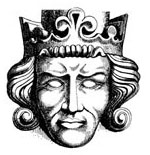
A Faith Enshrined, A Nation Renewed
UP FROM THE ASHES
“I pray, I command, that at every time and in everything…you may show favor not only to relations and kin, or to the most eminent, be they leaders or rich men or neighbors or fellow countrymen, but also to foreigners and to all who come to you. By fulfilling your duty in this way you will reach the highest state of happiness. Be merciful to all who are suffering violence, keeping always in your heart the example of the Lord who said, ‘I desire mercy and not sacrifice.’ Be patient with everyone, not only with the powerful, but also with the weak. Finally be strong lest prosperity lift you up too much or adversity cast you down. Be humble in this life, that God may raise you up in the next…. Be gentle so that you may never oppose justice. Be honorable so that you may never voluntarily bring disgrace upon anyone. Be chaste so that you may avoid all the foulness of lust like the pangs of death. All these virtues I have noted above make up the royal crown, and without them no one is fit to rule here on earth or attain to the heavenly kingdom.” — St. Stephen of Hungary’s admonitions to his son Imre
It has been a cataclysmic century for the central European country of Hungary. Orbiting between the powers in Vienna, Berlin, and Moscow, it endured national dismemberment by Western powers following World War I, Nazi seizure and control during World War II, and Soviet domination for forty years after that. The resultant scars have left it markedly diminished in size and natural resources and bereft of a significant proportion of its native population. To be sure, the twentieth century was unkind to Hungary.
The Hungarians, however, are a formidable people. Their historic resolve captured the world’s imagination during their heroic 1956 uprising against their communist masters that culminated in brutal repression by Moscow and the Red Army. But long before that, the Hungarian nation was known for its wide-ranging contributions to human civilization. Hungary has been, for the preponderance of its national existence, a predominantly Catholic nation. Its founder and king, St. Stephen (d. 1038), remains one of those rare monarchs of history who combined energy, vitality, sanctity, and practicality in forming the Hungarian nation after converting the fierce and marauding Magyar tribes to Catholicism a thousand years ago. His life and legacy are virtually synonymous with Hungary itself. Few Catholic king-saints can rival him when his achievements are taken in totality: Imagine Charlemagne’s administrative brilliance combined with St. Louis IX’s sanctity. Stephen was, like any great Catholic saint ought to be, especially devoted to the Virgin Mary. He built a stately church at Stuhlweissenburg in honor of the Mother of God, in which the kings of Hungary were afterwards crowned and buried.
Since its freedom from the yoke of communism following the fall of the Soviet Union, Hungary, like most former Soviet satellites, has moved in a Western direction, politically and economically. It joined NATO in 1999 and the European Union in 2004. And, like most of Europe, Hungary faces significant challenges. It still bears the scars of four decades of communist misrule combined with three generations of atheistic indoctrination. Like most former Soviet satellites, it has an abysmal fertility rate of 1.25, and as of 2010 its population was still in decline. Its economy faces the prospect of stagnant growth and deteriorating market conditions.
You May Also Enjoy
Here Catholics can discover a Church tougher and more unashamed than their own, and perhaps can learn how to persevere against a cultural elite that despises them.
Liberation theologians, Catholic and Protestant but mostly Catholic, have been a major factor in struggling against poverty in Latin America.
In Poland the presumption is that truth is one, and there is only the true Church. If it's not Catholic, it's not true. The spiritual maze is simple to navigate.

